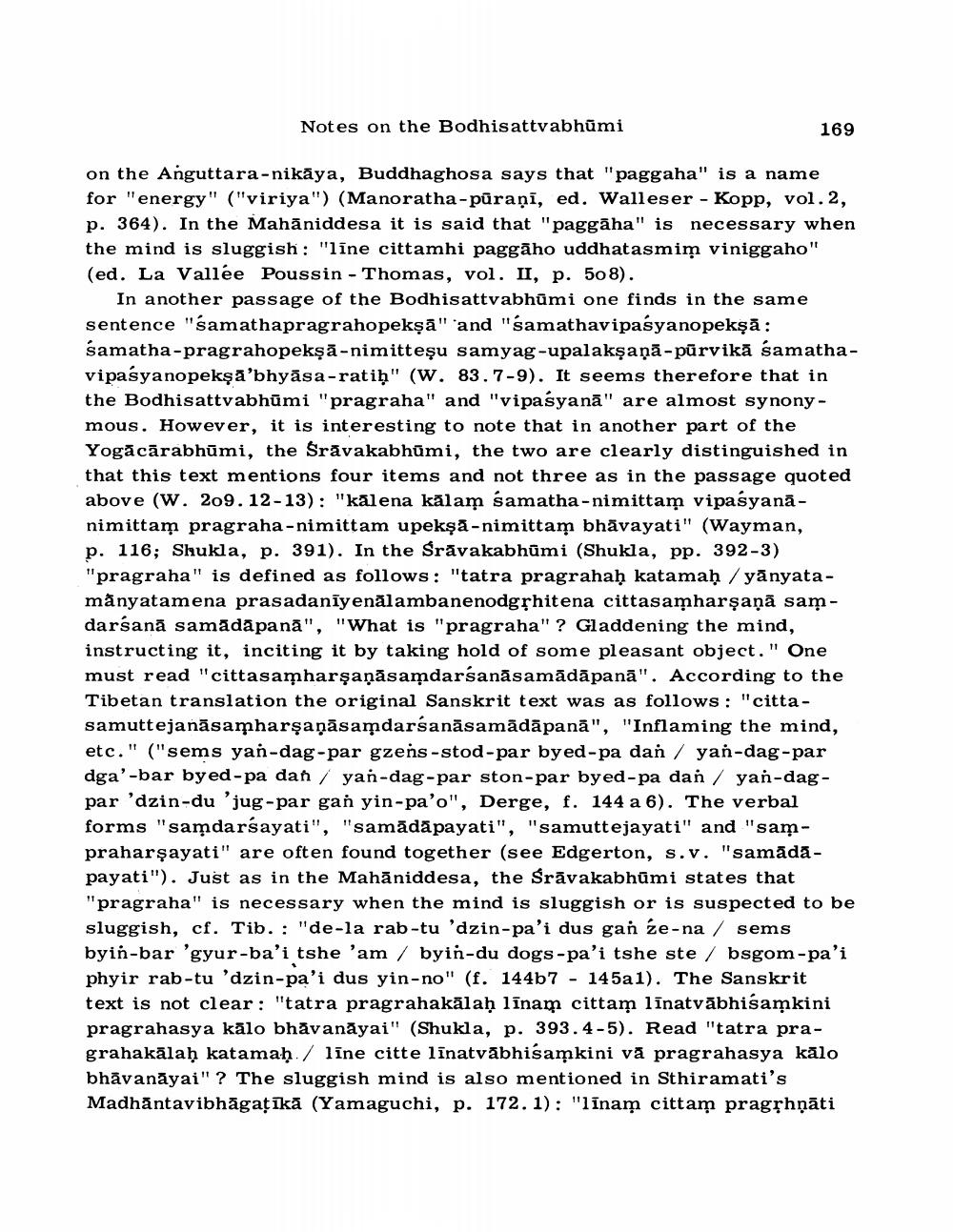Book Title: Notes On Bodhisattvabhumi Author(s): J W De Jong Publisher: J W De Jong View full book textPage 7
________________ Notes on the Bodhisattvabhūmi 169 on the Anguttara-nikāya, Buddhaghosa says that "paggaha" is a name for "energy" ("viriya") (Manoratha-pūraṇī, ed. Walleser - Kopp, vol.2, p. 364). In the Mahāniddesa it is said that "paggāha" is necessary when the mind is sluggish: "līne cittamhi paggāho uddhatasmim viniggaho" (ed. La Vallée Poussin - Thomas, vol. II, p. 508). In another passage of the Bodhisattvabhūmi one finds in the same sentence "samathapragrahopekṣā" and "samathavipasyanopekşā: samatha-pragrahopekşā-nimitteşu samyag-upalaksaņā - pūrvikā samathavipaśyanopekşā'bhyāsa-ratiḥ" (w. 83.7-9). It seems therefore that in the Bodhisattvabhūmi "pragraha" and "vipasyanā" are almost synonymous. However, it is interesting to note that in another part of the Yogācārabhūmi, the Srāvakabhūmi, the two are clearly distinguished in that this text mentions four items and not three as in the passage quoted above (W. 209. 12-13): "kalena kālam samatha -nimittam vipasyanā - nimittam pragraha -nimittam upekşă-nimittam bhāvayati" (Wayman, p. 116; Shukla, p. 391). In the Srāvakabhūmi (Shukla, pp. 392-3) "pragraha" is defined as follows: "tatra pragrahaḥ katamaḥ / yānyatamãnyatamena prasadanīyenālambanenodgrhitena cittasamharşaņā samdarsanā samādāpanā", "What is "pragraha" ? Gladdening the mind, instructing it, inciting it by taking hold of some pleasant object." One must read "cittasamharşaņāsamdarsanāsamādāpanā". According to the Tibetan translation the original Sanskrit text was as follows: "cittasamuttejanāsamharşaņāsamdarsanāsamādāpanā", "Inflaming the mind, etc." ("sems yan-dag-par gzeńs-stod - par byed-pa dan / yan-dag-par dga'-bar by ed-pa dan / yan-dag-par ston-par byed-pa dan / yan-dagpar 'dzin-du 'jug-par gan yin-pa'o", Derge, f. 144 a 6). The verbal forms "samdarsayati", "samādāpayati", "samuttejayati" and "sampraharşayati" are often found together (see Edgerton, s.v. "samādāpayati"). Just as in the Mahāniddesa, the Srāvakabhūmi states that "pragraha" is necessary when the mind is sluggish or is suspected to be sluggish, cf. Tib. : "de-la rab-tu 'dzin-pa'i dus gan ze-na / sems byin-bar 'gyur-ba'i tshe'am / byin-du dogs-pa'i tshe ste / bsgom-pa'i phyir rab-tu 'dzin-pa'i dus yin-no" (f. 144b7 - 145a1). The Sanskrit text is not clear: "tatra pragrahakālaḥ līnam cittam līnatvābhisamkini pragrahasya kālo bhāvanāyai" (Shukla, p. 393.4-5). Read "tatra pragrahakālah katamah. / line citte linatvābhisamkini vă pragrahasya kālo bhāvanāyai"? The sluggish mind is also mentioned in Sthiramati's Madhāntavibhāgaţikā (Yamaguchi, p. 172. 1): "līnam cittam pragshṇātiPage Navigation
1 ... 5 6 7 8 9 10
